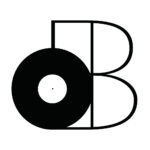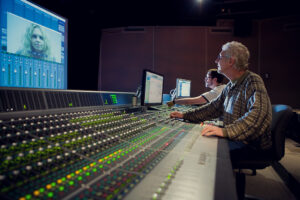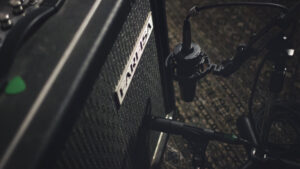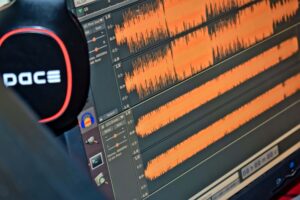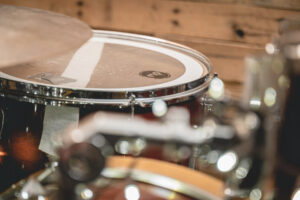Understanding which parts of a song can be copyrighted is essential for independent publishers/labels. It’ll provide the foundation for a strong defense if you ever get accused of copyright infringement. However, you’ll hopefully be avoiding that battle altogether with this knowledge!
The most common parts of a song that can be copyrighted are the melody and the lyrics. However, there are many more elements to consider like harmony, rhythm, arrangement and the list goes on. It’s more difficult to copyright certain parts of a song and we’ll be learning why. It’s also worth noting that there are differences between the musical work and the musical recording. We’ll be discussing all of this and much more because intellectual property law is quite complex… I’m not an expert so take everything you read lightly and do your own research, but hopefully my understanding of the subject can assist you in achieving the same peace of mind as I have. Let’s get started!
- The musical work VS the musical recording
- Can the melody (the “hook”) of a song be copyrighted?
- Can the lyrics (the “words”) of a song be copyrighted?
- Can the harmony (the “chord progression) of a song be copyrighted?
- Can the rhythm (the “groove”) of a song be copyrighted?
- Can the arrangement (the “structure”) of a song be copyrighted?
- Protect your copyrights and protect yourself from copyright infringement
Disclaimer: I am not a lawyer or qualified to give you legal advice.
The musical work VS the musical recording
Did you know that you could own TWO copyrights for one piece of music. In recent years (well, not that recently), the musical recording itself is also protected under the Copyright Act.
In 1909, the original Copyright Act only covered the written musical work (sheet music).
The update in 1971 which also included musical recording was much needed since most people don’t read sheet music. Most of us hear music on TV, the radio and/or streaming services.
Nowadays, most of us don’t even write sheet music anymore so that’s another issue.
Either way, as long as you manage to secure one of these copyrights, you’ll be fairly protected and guess what… The copyright is created THE MOMENT it manifests itself into tangible form.
That could be through:
- Voice-Memo
- Studio Recording
- Piece of Paper
- Sheet Music
OR anything tangible that you could present in court.
It’s also possible to register your copyrights for additional protection, but we won’t be talking about that in this article.
Just keep in mind that both the recording and the sheet music can be copyrighted.
Can the melody (the “hook”) of a song be copyrighted?
YES. When thinking of your favourite song… What comes to mind? The most memorable part of a song is usually it’s melody which can also be considered the “hook”.
However, the term “musical hook” is slightly more ambiguous than melody.
Here are some examples of musical hooks:
- Melodies (the melody to any jazz standard)
- Licks (the opening to “CAFO” by Animals as Leaders)
- Riffs (opening to “Iron Man” by Black Sabbath)
- Loops/Samples
- Lyrics/Shout
If you aren’t familiar with any of these terms, then you’re probably not a musician…
For most of us though, at least one of these hooks should be familiar. It really depends on the genre(s) of music you’re used to composing/producing.
Regardless, you’ll most likely be using your “hooks” as the basis for your copyrights.
As I already mentioned, it’s the most memorable part of your song.
If another artist were to use the same “hook” in their song, it would most likely confuse listeners as to which one is the original. It’s happened many times throughout the course of history…
For example, there’s the case between Led Zeppelin and Spirit.
The plaintiff (Spirit) claimed that the opening to “Stairway to Heaven” was a copy of their song “Taurus” which was released prior to Led Zeppelin’s classic.
The start of “Stairway to Heaven” can be considered a melody/riff (I consider it a melody).
If that doesn’t prove my point, you can go and research some other cases of copyright infringement. You’ll notice that most of the accusations are founded on the melody/hook.
Can the lyrics (the “words”) of a song be copyrighted?
YES. Besides the actual melody behind the lyrics, the words themselves are quite important when it comes to establishing copyright. It’s basically like copyrighting a poem.
The only difference is the melody/rhythm behind the words are also included in the copyright.
However, you might be thinking that the amount of possibilities when it comes to words is finite.
That’s definitely true and it’s actually the same when it comes to melodies. There are bound to be songs that sound similar or VERY similar to each other.
It’s just a question of probability (not necessarily malintent in most cases).
That being said, we’re really considering the lyrics to the ENTIRE song, not just one line.
Some combinations of words used in popular music also belong to pop-culture, so those aren’t copyrightable. It’s much easier to check for plagiarism when it comes to lyrics though.
Here are 4 tools you can use:
- https://www.quetext.com/
- https://plagiarismdetector.net/
- https://www.grammarly.com/plagiarism-checker
- https://www.duplichecker.com
You’ll realize that it’s very difficult to get 0% which is fine.
Just try to keep it as low as possible.
Can the harmony (the “chord progression) of a song be copyrighted?
KIND OF. It just really depends how distinct the chord progression is, but most of the time it’s the melodic element of the chord progression that can be copyrighted (not the harmony itself).
For example, let’s consider the copyright infringement case between Justin Bieber and Asher Monroe. As it turns out, they both used a loop from Splice Sounds (well, their producers did).
The “catchy” part of that loop is the melody you can probably hum.
However, there’s an underlying chord progression/harmony to that loop.
If the music producers had simply used this loop for inspiration and “extracted” the harmonic elements, they could’ve easily made their own unique version.
What I’m trying to say is that both these tracks would sound different even though they’d technically be sharing the same chord progression.
That’s not the case though since they’re both using the exact same loop.
If you want to get really technical, it’s what we refer to as “voice-leading” that can be copyrighted. We’re talking about the melodies inside the chord movements.
It’s also worth mentioning that certain chord progressions like…
- The 12-Bar Blues
- The Rhythm Changes
- I-vi-ii-V
AND many other chord progressions are part of the public domain.
It’s difficult to give a definite answer on this one, but it’ll really depend on genre more than anything. Other than that, remember that it’s the “voice-leading” that makes your chord progression sound distinct, not the chords/harmony itself.
Can the rhythm (the “groove”) of a song be copyrighted?
NOT REALLY. Not to be condescending or anything, but you’ll notice that most Hip Hop “beats” sound pretty much the same with very slight variations. What about dance music?
The answer to that question is usually NO, but I’m sure there are exceptions.
For example, if we’re talking about some of the most sampled “grooves” in history (like James Brown’s “Funky Drummer”), it may be possible.
I mean, you need clearance to use that loop in your commercial projects.
That’s probably because the drum part is distinct enough to be considered its own copyright.
Once again, there’s no “clear-cut” answer for this one, but I’d take the genre into consideration once again. Funk music has LOTS of variety when it comes to rhythm, but simpler genres like EDM are pretty generic sounding.
The more complex something is, the more likely it can be copyrighted (from observation, that’s not an actual fact).
Can the arrangement (the “structure”) of a song be copyrighted?
NO. That’d be like saying you copied someone for using the “verse-chorus-verse-chorus” structure. If you haven’t noticed, that probably encompasses 99.9% of the music you’ve heard.
Just because songs have the same (or similar) structure, it doesn’t mean that they’ll sound anything alike. Remember, the parts of the song that can be copyrighted need to be DISTINCT.
It’s also worth considering that one song can have multiple arrangements.
Protect your copyrights and protect yourself from copyright infringement
Now that you understand which parts of your song can be copyrighted, you’ll also have a better idea of how to protect yourself from potential copyright infringement.
You’ll also have some valuable knowledge to defend your intellectual property should anyone ever accuse you of copyright infringement.
In this industry, knowledge really is power…
That being said, you might be interested in reading this article I wrote on mitigating the risks of copyright infringement. It includes the same techniques I use to avoid the risks associated with creating valuable intellectual property, so don’t miss out!
Other than that, the best way to protect your copyrights is to create a track record.
I don’t mean mailing/emailing yourself, that doesn’t actually work…
Whether you’re publishing/distributing your music through streaming services and/or music libraries, it’ll create some form of evidence that’s guaranteed by another party.
In other words, keeping your music on your hard drive isn’t going to do you much good!
Send your music out to work for you as soon as possible!
At the very least, I recommend that you register with one of these music distribution services just to get your music out there. You can always remove it once you decide what you want to do with it and don’t worry… Unless you promote, nobody will hear your music.
I also recommend checking out some of the articles I wrote on registering your tracks with the proper organizations (like PROs).
If you have any questions, feel free to leave us a comment!
Sources
https://www.buzzfeed.com/reggieugwu/what-the-law-says-about-music-plagiarism
